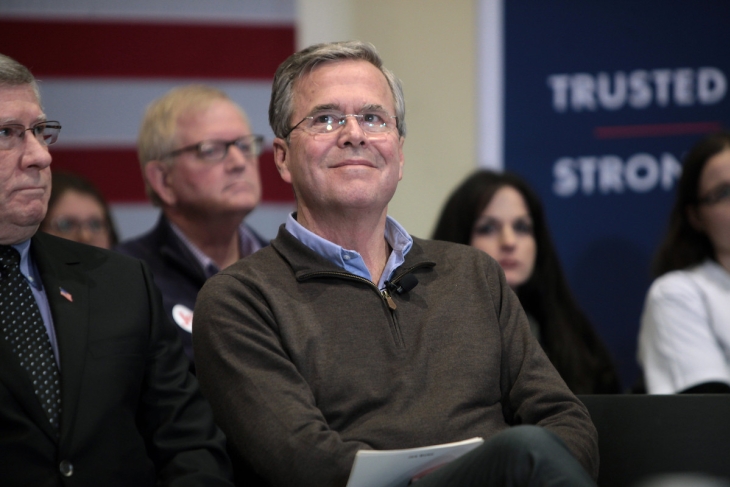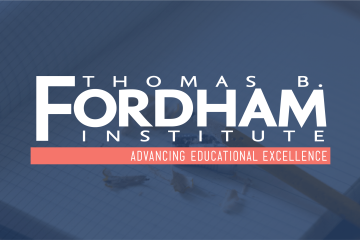Neither of the major parties’ presumptive presidential nominees has anything serious in the offing to help American students get back on track. Both Biden’s unimaginative kowtowing to the teachers unions’ hoary agenda and Trump’s fantastical, funhouse mirror positions leave an awful lot to be desired. The resulting dyspepsia recently got me—along with Pepto Bismol—imagining what the current state of play might be like if the political environment had been suited to elect a President Jeb Bush back in 2016. What could Florida’s former and preeminent education governor have accomplished for our nation’s schools?
It’s a counterfactual worth contemplating because leadership matters even when it comes to the arcana of education policy. As my colleague Mike Petrilli once observed:
If and when we are blessed with a leader—a president probably, or maybe an education secretary—who can find common cause with folks on the left, right, and center and paint a picture of a better education system, and how to build it, I suspect most Americans will be happy to follow.
Bush would have been such a leader: a bridge builder, a policy wonk, and an unapologetic education champion.
On Earth 2, a “Bush 45” would be wrapping up his second and final term, having deftly led the nation through the pandemic by prioritizing school reopenings and holding states and districts accountable for using federal relief dollars in smart ways that target student achievement. It’s a stark contrast to what actually happened, but it’s not the whole story. By my lights, we’d have seen three other notable differences in the policy trajectory.
The first would be Bush’s choice for education secretary. A top contender would have been former Indiana Governor Mitch Daniels, whom Bush recognized with ExcelinEd’s first “Excellence in Education Award” back in 2012. A prospective presidential candidate in his own right, Daniels would have been exceedingly qualified, having led successful reform efforts in both K–12 and higher ed. Another inspired pick would have been Daniels’s sidekick, former Indiana state superintendent Tony Bennett—whom Bush recruited to Florida to become the state’s top education official. Bennett would have brought ambitious goals to the role, and would not abide the embarrassing drivel being served up by this U.S. Department of Education. (Full disclosure: I worked for Bennett during his tenures in Indiana and Florida.)
Second, Bush would have placed a premium on state, district, and school accountability, an emphasis that’s sorely lacking as achievement gaps continue to grow in all grades and subjects, and as the push for outcomes slackens. In the opening paragraph of an op-ed that Bush authored last December, he wrote:
If you had to pick one issue in K–12 education where Florida policymakers need to maintain their focus in the coming years, the answer is clear: accountability.
As president, Bush would have never condoned the easing off of accountability pressures that policy guru Chad Aldeman says is a primary, if not predominant, factor in the precipitous decline in achievement post-NCLB:
When schools felt pressure from state accountability systems, they increased their academic standards and boosted achievement in ways that had long-term benefits for students... Holding school systems accountable for their lowest-performing students was working—until policymakers decided the pressure wasn’t worth it.
Rest assured that the forces of resistance and repeal are elated that neither Biden nor Trump shows any interest in holding school systems accountable for academic performance.
Finally, unlike the White House’s current occupant, Bush would have brought big ideas to the table—and the temerity to implement them. In fact, he offered a blueprint on the campaign trail that’s as salient now as it was before the pandemic—a plan grounded in four conservative principles:
1) education decisions should be made as close to the student as possible; 2) choice of all kinds should be expanded; 3) transparency is essential to accountability; and 4) innovation requires flexibility.
Yes, this included the expansion of education savings accounts, but it also called for doubling support for charter schools. It contained elements that the left (college affordability), right (school vouchers), and center could have embraced. Most importantly, Bush would have offered an expansive vision for improving schools, and an attention to detail to an issue that is usually relegated to the backseat during presidential elections.
To be sure, among voters, the Commander in Chief’s outlook towards ed policy is the least of their worries. But in an age when all politics is national, it’s deeply unsatisfying to just wait for the pendulum to swing back and, in the interim, hope that governors take up the education baton. Bush’s words from his blueprint are particularly haunting following the erasure of decades of academic progress in that it’s hard to imagine today’s elected leaders being so clear-eyed about what America’s charge must be:
As governor of Florida, I increased student achievement across the board, particularly for those most at risk, and as president, I will do the same.




